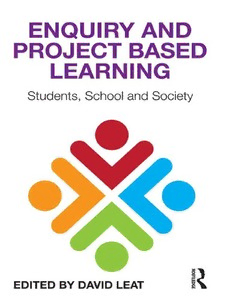Table Of Contentr e h a n j a n d a @ g m a i l . c o m
B U T U H L E N G K A P H U B
Enquiry and Project Based Learning
Many teachers, schools, parents and community organisations feel that
‘standards’ education is not serving us well. It has proved ineffective at
preparing many students for work, higher education and general wellbeing,
nor does it keep students engaged and intrinsically motivated, capable of
sustaining interest in education and learning. There is a suppressed desire to
transform educational outcomes, and enquiry based learning (EBL) and
project based learning (PBL) are the prime candidates for achieving such a
goal.
EBL is education that is driven by curiosity, questions and problem solving,
with the capacity to produce results that are equal to or better than standard
outcomes. This new text provides a critical examination of EBL and PBL by
exploring a wide range of international exemplars and considering the
benefits, barriers and contradictions generated by the efforts of teachers and
schools. Focusing on analytical frameworks and socio-cultural theory, areas
covered include:
enquiry and society
what EPBL is
learning through enquiry
challenges for schools and teachers
student outcomes and assessment
teacher learning
curriculum development.
Enquiry and Project Based Learning offers analytical frameworks and
practical guidance for students, teachers and all those interested in enquiry
based learning, as well as presenting a balanced, purposeful and motivating
alternative to mainstream educational practice.
David Leat is Professor of Curriculum Innovation at Newcastle University,
UK, Director of the Research Centre for Learning and Teaching, and Assistant
Director of SOLE Central (researching Sugata Mitra’s Self Organised Learning
Environments concept). He is also coordinator of the North East EPBL
Network.
Enquiry and Project Based Learning
Students, School and Society
Edited by David Leat
First published 2017
by Routledge
2 Park Square, Milton Park, Abingdon, Oxon OX14 4RN
and by Routledge
711 Third Avenue, New York, NY 10017
Routledge is an imprint of the Taylor & Francis Group, an informa business
© 2017 selection and editorial matter, David Leat; individual chapters, the contributors
The right of David Leat to be identified as the author of the editorial material, and of the
authors for their individual chapters, has been asserted in accordance with sections 77 and
78 of the Copyright, Designs and Patents Act 1988.
All rights reserved. No part of this book may be reprinted or reproduced or utilised in any
form or by any electronic, mechanical, or other means, now known or hereafter invented,
including photocopying and recording, or in any information storage or retrieval system,
without permission in writing from the publishers.
Trademark notice: Product or corporate names may be trademarks or registered trademarks,
and are used only for identification and explanation without intent to infringe.
British Library Cataloguing in Publication Data
A catalogue record for this book is available from the British Library
Library of Congress Cataloging in Publication Data
Names: Leat, David, author.
Title: Enquiry and project based learning : students, school and society / David Leat.
Description: New York : Routledge, 2017.
Identifiers: LCCN 2016043173 | ISBN 9781138790155 (hardback) | ISBN 9781138790179 (pbk.) |
ISBN 9781315763309 (ebook)
Subjects: LCSH: Project method in teaching. | Inquiry-based learning.
Classification: LCC LB1027.43 .L42 2017 | DDC 371.3/6--dc23
LC record available at https://lccn.loc.gov/2016043173
ISBN: 978-1-138-79015-5 (hbk)
ISBN: 978-1-138-79017-9 (pbk)
ISBN: 978-1-315-76330-9 (ebk)
Typeset in Bembo
by Saxon Graphics Ltd, Derby
Contents
List of illustrations
List of contributors
1 Why we need enquiry and project based learning
David Leat
2 Understanding enquiry
David Leat
3 Assessment of learning outcomes in EPBL
David Leat
4 Enquiry and project based learning: students, school and society through a
socio-cultural lens
David Leat
5 Adapting Self Organised Learning Environments to primary schools in
Australia
Paul Kenna and Brett Millott
6 Balancing structure and flexibility: teacher’s orchestration in collaborative
long-term inquiry
Marjut Viilo, Pirita Seitamaa-Hakkarainen and Kai Hakkarainen
7 Developing a community orientation through a focus on local heritage and
environment
Viki Angel, Lucy Eckford and Lisa Lowery
8 The importance of audience in project based learning
Cara Littlefield
9 The Broomley Bee Meadow Project
Julie McGrane, Jilly Halliday and Stuart Moore
10 Community curriculum making and EPBL
David Leat and Ulrike Thomas
Index
List of Illustrations
Figures
6.1 Three-picture series illustrating Example 1 and its continuity: a) the
students’ initial working theories in a messy view; b) Anna has a
suggestion; c) the note to be organised
6.2 Three-picture series illustrating Example 2 and its continuity: a) Theo’s
open note in the shared view; b) the group of students trying to make
filament glow; c) the lamp and electricity experiments view at the end of
the thematic phase
7.1 Map showing locations in Northeast England used by Percy Main Primary
School
8.1 A screenshot of the title of a students’ documentary to accompany their
game
8.2 A class visiting a local war memorial in Yorkshire
8.3 A K’NEX® structure
8.4 Some of the K’NEX® earthquake-proof structures at the presentation event
9.1 Initial curriculum map for the Bee Project
9.2 Gantt chart for planning the Bee Project
9.3 Some research tasks for the Bee Project
Tables
2.1 Enquiry dimensions
3.1 Convergent and divergent assessment (adapted from Torrance and Pryor,
1998)
3.2 A conceptual framework for considering assessment in EPBL
3.3 Outcome by levels model for documentation and assessment
4.1 McKnight’s (2003) comparison of present and future policy
4.2 Assumptions underpinning performative and asset-based approaches to
education
5.1 An example of the typical hierarchy of questions, which acts as a planning
protocol or tool
5.2 Some of Hattie’s ‘Visible Learning’ effect sizes that relate to SOLEs
practice
6.1 The content of the teacher’s project diary template
7.1 Heritage Schools teachers’ training course components
7.2 The pattern of use of the locality, environment and people by Percy Main
Primary School

